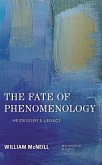This collection of essays by one of the foremost figures in contemporary theory takes as its theme the edge or limit between language, time, history, and politics. These are essays that are all on the brink, the very extreme at which one can no longer define where one is located, neither on the cliff, say, nor over the edge. To be on the brink is to take up that extreme limit, the point of contamination or indetermination where language, time, history, and politics all converge upon one another. On the Brink begins with a consideration of Kant's treatment of time as representation and of Hegel's treatment of the writing of history and the end of art, all while taking up other key figures in the history of philosophy. The book then moves to an exploration of language in a variety of manifestations, from translation to complaint and greeting. It concludes by analyzing political and social questions that continue to haunt us today-the conception of work, not least in National Socialism, and our relationship to democracy. Taken together, Werner Hamacher's essays offer trenchant historical, political, and rhetorical interventions into the history of philosophy, literature, and our contemporary political situation.
Bitte wählen Sie Ihr Anliegen aus.
Rechnungen
Retourenschein anfordern
Bestellstatus
Storno









